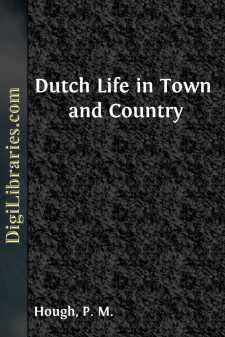Categories
- Antiques & Collectibles 13
- Architecture 36
- Art 48
- Bibles 22
- Biography & Autobiography 813
- Body, Mind & Spirit 142
- Business & Economics 28
- Children's Books 17
- Children's Fiction 14
- Computers 4
- Cooking 94
- Crafts & Hobbies 4
- Drama 346
- Education 46
- Family & Relationships 57
- Fiction 11829
- Games 19
- Gardening 17
- Health & Fitness 34
- History 1377
- House & Home 1
- Humor 147
- Juvenile Fiction 1873
- Juvenile Nonfiction 202
- Language Arts & Disciplines 88
- Law 16
- Literary Collections 686
- Literary Criticism 179
- Mathematics 13
- Medical 41
- Music 40
- Nature 179
- Non-Classifiable 1768
- Performing Arts 7
- Periodicals 1453
- Philosophy 64
- Photography 2
- Poetry 896
- Political Science 203
- Psychology 42
- Reference 154
- Religion 513
- Science 126
- Self-Help 84
- Social Science 81
- Sports & Recreation 34
- Study Aids 3
- Technology & Engineering 59
- Transportation 23
- Travel 463
- True Crime 29
Dutch Life in Town and Country
by: P. M. Hough
Description:
Excerpt
Chapter I
National Characteristics
There is in human affairs a reason for everything we see, although not always reason in everything. It is the part of the historian to seek in the archives of a nation the reasons for the facts of common experience and observation, it is the part of the philosopher to moralize upon antecedent causes and present results. Neither of these positions is taken up by the author of this little book. He merely, as a rule, gives the picture of Dutch life now to be seen in the Netherlands, and in all things tries to be scrupulously fair to a people renowned for their kindness and courtesy to the stranger in their midst.
And this strikes one first about Holland—that everything, except the old Parish Churches, the Town Halls, the dykes and the trees, is in miniature. The cities are not populous, the houses are not large, the canals are not wide, and one can go from the most northern point in the country to the most southern, or from the extreme east to the extreme west, in a single day, and, if it be a summer's day, in day-light, while from the top of the tower of the Cathedral at Utrecht one can look over a large part of the land.
[Illustration: Types of Zeeland Women.]
As it is with the natural so it is with the political horizon. This latter embraces for the average Dutchman the people of a country whose interests seem to him bound up for the most part in the twelve thousand square miles of lowland pressed into a corner of Europe; for, extensive as the Dutch colonies are, they are not 'taken in' by the average Dutchman as are the colonies of some other nations. There are one or two towns, such as The Hague and Arnhem, where an Indo-Dutch Society may be found, consisting of retired colonial civil servants, who very often have married Indian women, and have either returned home to live on well-earned pensions or who prefer to spend the money gained in India in the country which gave them birth. But Holland has not yet begun to develop as far as she might the great resources of Netherlands India, and therefore no very great amount of interest is taken in the colonial possessions outside merely home, official, or Indo Dutch society.
[Illustration: Zeeland Peasant—The Dark Type.]
With regard to the affairs of his country generally, the state of mind of the average Dutchman has been well described as that of a man well on in years, who has amassed a fair fortune, and now takes things easily, and loves to talk over the somewhat wild doings of his youth. Nothing is more common than to hear the remarks from both old and young, 'We have been great,' 'We have had our time,' 'Every nation reaches a climax;' and certainly Holland has been very great in statesmen, patriots, theologians, artists, explorers, colonizers, soldiers, sailors, and martyrs. The names of William the Silent, Barneveldt, Arminius, Rembrandt, Rubens, Hobbema, Grotius, De Ruyter, Erasmus, Ruysdael, Daendels, Van Speijk, Tromp afford proof of the pertinacity, courage, and devotion of Netherland's sons in the great movements which have sprung from her soil....


